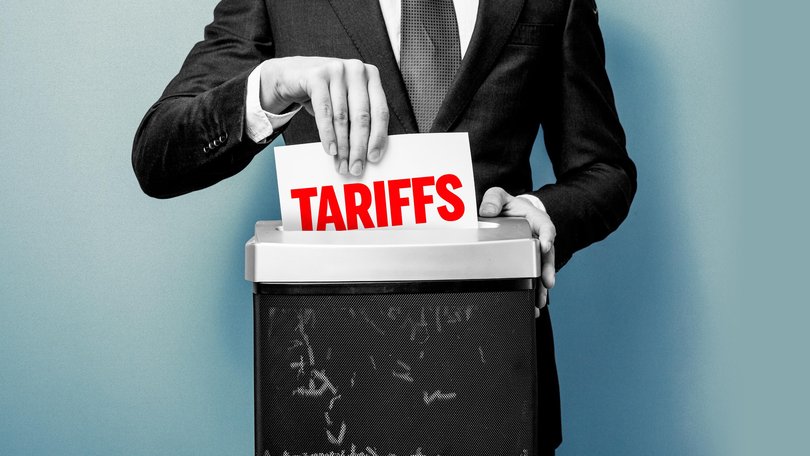DOMINIC PINO: Let Trump build his tariff wall if he wants to, it’s an economic prison of his own making
DOMINIC PINO: Foreign leaders can hold out hope that the domestic political damage to Trump will eventually convince him of what trade economists cannot, and the full benefits of free trade can come eventually.

Whether the August 1 deadline for President Donald Trump’s tariffs is actually binding remains to be seen — remember, April 2 was supposed to be “Liberation Day” — but foreign leaders must be thinking about how they’ll respond.
In many cases, they’ve already threatened to react in kind and are weighing new tariffs on everything from Pennsylvania steel to Kentucky bourbon.
Foreign leaders are correct that Trump is in the wrong here. But for the same reason his tariffs are a misguided and self-destructive exercise for Americans, it would be a mistake for other nations to launch their own. To protect their consumers and businesses, the best move they can make is to eliminate all their tariffs, even if Trump refuses to follow their lead.
Sign up to The Nightly's newsletters.
Get the first look at the digital newspaper, curated daily stories and breaking headlines delivered to your inbox.
By continuing you agree to our Terms and Privacy Policy.Typically, countries “retaliate” when another country imposes tariffs on their goods. That’s in scare quotes because they aren’t really retaliating against the other country. They’re hurting their own citizens with tax hikes in response to the other country hiking its own taxes.
One of Trump’s many misunderstandings about trade is his strongly held belief that foreigners pay US tariffs. Though, in theory, it is possible for some of the tax incidence to be borne by foreigners, real-world studies have consistently found that tariffs are borne by the citizens of the country that imposes them.
Milton Friedman wrote in his 1962 book Capitalism and Freedom: “We would be benefited by dispensing with our tariffs even if other countries did not” rejecting conventional wisdom that reciprocity was the foundation of trade. The “we” in his advice was the United States, and even though his ideas on trade are not held in high regard by the current US Government, other countries have shown willingness to take them up. The global average tariff rate has fallen steadily over the past three decades, and many of those reductions were done unilaterally to levels below the maximum rates allowed by the World Trade Organization.
In recent years, Canada and Switzerland both unilaterally eliminated all tariffs on manufacturing inputs. They did so because they realised it was bad policy to tax their own manufacturing companies extra. What was good for manufacturing companies is also good for the people in general.
None of America’s largest trading partners rely on tariffs for a significant portion of their government revenue, and most rich countries were already more open to trade than the US was pre-Trump. Getting rid of their remaining tariffs would be a win for their people.
If tariff revenue is already insignificant, the revenue loss of eliminating them will be, too. They should eliminate them on goods from all countries, not just the US. Foreign leaders can tell their chambers of commerce that they want maximum flexibility for businesses to adapt to US capriciousness by lowering barriers to trade with all nations. Tariffs are often a thorny political issue domestically. Now there’s a chance to do away with them for the greater good (from foreigners’ point of view) of sticking it to big bully Trump.
In theory, lowering tariffs and demonstrably refusing to retaliate might make Trump more amenable to a deal. He’s said as much, at least. Most countries, even when they don’t like the US president, want to get along with the United States. It’s good to be friendly with the country that has the largest economy and strongest military in the world.
Zeroing out tariffs is still unlikely to induce the US to do the same, though. Trump thinks foreign trade restrictions are responsible for US trade deficits, which his team has made clear is their primary concern. They aren’t — they have more to do with comparative advantages, savings rates and consumer preferences than with tariffs — and they do not hurt the US economy either way.
This mistaken focus on trade deficits means that even slashing tariffs to nothing might not satisfy the White House’s demands. Foreign leaders should be OK with that. It would be better for both countries if they each eliminated their tariffs, but one is better than none.
This dynamic has already played out with the deal Trump said the US struck with Vietnam. The US applied a 20 per cent tariff to Vietnamese goods, while Vietnam eliminated its tariffs on US goods, according to the President. This is bad for Americans, who will now pay higher taxes for goods from a significant trade partner, but the Vietnamese are better off than they would be in a tit-for-tat trade war. It’s not capitulating when your negotiating partner is taking himself hostage. And foreign leaders can hold out hope that the domestic political damage to Trump will eventually convince him of what trade economists cannot, and the full benefits of free trade can come eventually.
Leaders in free countries around the world don’t have to acquiesce to Trump’s desire to reduce global trade and increase protectionism. If the communists in Vietnam could eliminate their tariffs, so can the free world. Let Trump build his tariff wall if he wants to. It’s an economic prison of his own making; there’s no need to build another one themselves.
Dominic Pino is the economics editor and Thomas L. Rhodes fellow at National Review and host of the American Institute for Economic Research podcast “Econception.”
